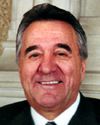Madam Speaker, I address the motion by the member for Ottawa—Vanier. His original amendment would have had the Official Languages Act apply to contractors and subcontractors operating in Canada's national parks.
As members are well aware, the Official Languages Act already applies to personnel employed in the national parks who must deal with the public. It was never intended to apply to people who did not have a public presence in those parks which is only logical.
In western Canada it is very difficult for people to acquire a second language given the circumstances in the location. To expect that somehow we are going to be able to supply bilingual people for these positions on a regular basis is really hoping for too much.
The position that we have taken on this bill is one which has been supported by the Minister of Justice. I would like to read a letter into the record which she sent to the Secretary of State for Parks. It very clearly expresses the concerns that we have on this issue. The fact that it is a letter written by the Minister of Justice should add some substance and credibility to our position:
I understand that, during review of Bill C-29 ( Canada Parks Agency Act ) in the Standing Committee on Canadian Heritage, questions have been raised about the application of the Official Languages Act (OLA) to the proposed Agency and to its contractors and subcontractors. I am writing to confirm the position of the Department of Justice on this matter, namely that:
- Assuming that Bill C-29 is enacted in its current form, the Agency would be a “federal institution” under the Official Languages Act and, consequently, would be subject to all linguistic obligations set out in that Act.
Under Bill C-29, the agency would be considered as an agent of Her Majesty in right of Canada. Section 3 of Bill C-29 states that “there is hereby established a body corporate to be called the Canada Parks Agency, that may exercise powers and perform duties and functions only as an agent of Her Majesty in right of Canada ” [we underline]. In view of s. 3(1)(h) of the OLA which states that “any other body that is specified by an Act of Parliament to be an agent of Her Majesty in right of Canada (—)” is a federal institution, the Agency would clearly be considered as a federal institution and consequently, the OLA would fully apply to the Agency.
Furthermore, Bill C-29 also states in s. 4(1), that the “Minister is responsible for and has the overall direction of the Agency” and, at s. 4(2), that “the Agency shall comply with any general or special direction given by the Minister ” [we underline]. This requirement is also referred to in the second part of s. 3(1)(h) of the OLA where it is stated that a federal institution is also “any other body that is (—) to be subject to the direction of (—) a Minister of Crown”. As a consequence, the Agency would also meet this other criteria and, therefore, be clearly contemplated as a federal institution under the OLA .
In addition, section 50 of the Bill C-29 states that “Schedule II of the Federal Administrative Act , [FAA] is amended by adding the following in alphabetical order: (—) Canadian Parks Agency”. This schedule identifies the “departmental corporations” under the FAA , and under s. 2 of the FAA , the departmental corporations are considered to be “ department [s]” (we underline).
Under s. 3 of the OLA , the definition of “federal institution” includes “department[s] of the Government of Canada”. The Agency would thus be considered a “department” under s. 3 of the OLA and s. 2 of the FAA , and would consequently also be subject to the obligations and duties of the OLA because of that status.
In summary, in view of the definition of federal institutions as described in s. 3(1)(f) and (h) of the OLA , our position is that the Agency would be a federal institution under that Act because it is (i) an agent of Her Majesty, (ii) under the direction of a Minister of the Crown, and (iii) a department of the Government of Canada. As a result, it would be subject to the full linguistic duties and obligations of the OLA .
II. If the Agency were to contract-out services to the public which, under the Official Languages Act , have to be provided in both official languages, section 25 of that Act would require the Agency to ensure that the services provided on its behalf continue to be offered in both official languages.
Section 25 of the OLA was enacted to ensure that federal institutions would not circumvent their duties under Part IV of the OLA (and a fortiori , under s. 20 of the Canadian Charter of Rights and Freedoms ) when contracting out their services to third parties. S. 25 can only apply if we conclude that, in a given circumstance, the third party providing services to the public is acting on behalf of a federal institution. In every situation, the issue of whether a third party is acting on behalf of a federal institution must be determined on a case-by-case approach, on the basis of the circumstances and particularities of the arrangement between the federal institution and the third party.
In their usual meaning, the words “on behalf of” refer to the idea that one party is undertaking to do something for the benefit and as a representative of another party, generally at the request of the latter: “Behalf: 1 in the interest of (a person, principle, etc.). 2 as representative of (acting on behalf of my client”, in The Concise Oxford Dictionary , 8th ed., p. 99.
In our view some types of arrangements will clearly fall under the purview of s. 25, for instance if a federal institution is legally responsible—i.e., on the basis of an Act of Parliament, a contract or any rule of law—for the administration or undertaking of a particular activity or for the provision of services or communications to the public. In the event that the federal institution decides to contract out these services to a third party, the latter would be acting on behalf of the federal institution. As a consequence, s. 25 would apply and the federal institution would have to ensure that the third party providing the services and communications does so in compliance with the linguistic requirements of Part IV of the OLA.
Another type of arrangement which, in our view, would also be covered by s. 25 is the contract of mandat (or mandate) in civil law and of “agency” at common law. The rules of the mandat are based on the idea of representation: “[l]e mandataire [—] n'agit—” At common law, the power, vested in the hands of the agent, “is a power to affect his principal's position by doing acts on his behalf” ( Chitty on Contracts , Volume II, p. 22—we underline). Agency normally requires that the agent represent the principal. Indeed, the purpose and effect of the agency relationship are to transfer to the agent the authority of the principal to act, thereby enabling the agent to affect the principal's legal relations with third parties (C.E.D.(Ont.) 3rd ed., p. 49). As a consequence, in cases where the contract between the federal institution and the third party is considered to be a mandat or an agency relationship, the third party would be acting on behalf of the federal institution and s. 25 would require that its services and communications to the public be available in both official languages, in compliance with Part IV of the OLA.
That being said, the term “on behalf” should not necessarily be limited only to the types of arrangements described above, as a too narrow interpretation of s. 25—
The justice minister in No. III talks about the insertion of a linguistic clause in Bill C-29 not being advisable. She points out:
—the—wording of this amendment goes beyond the current application of the Official Languages Act since it seems to suggest that all parts of the OLA would apply to contractors and subcontractors of the Agency, as if they were federal institutions. This would have the effect of creating linguistic obligations for the contractors and subcontractors of the Parks Agency that do not currently exist under the OLA for contractors and subcontractors of other federal institutions.







